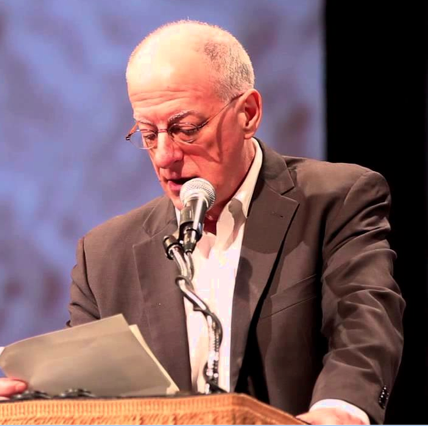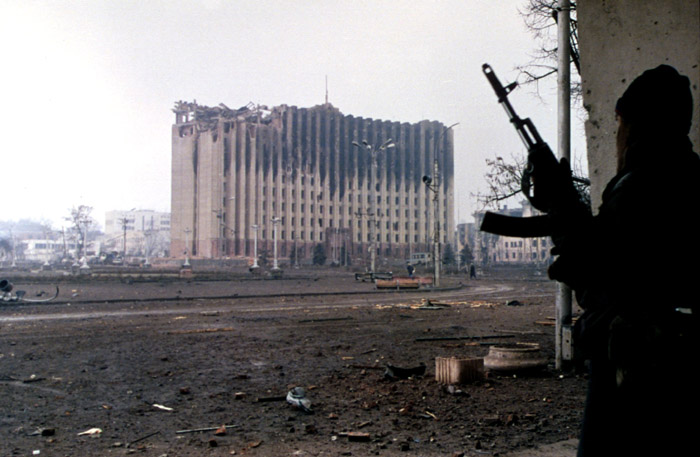Terror and Jauntiness
Le Monde in Paris ran a story a few weeks ago by Luc Leroux reporting on a fifteen-year-old boy in Marseille who attacked a Jew in the street with a machete, and one element of the story cries out for commentary. That is the boy's tone, as conveyed in the police statement. The boy is said to have told the police: "Too bad the machete was badly sharpened, because I would have cut him in two." The boy said he would have liked to visit Syria―Palmyra especially.
Published by The Lawfare Institute
in Cooperation With

Le Monde in Paris ran a story a few weeks ago by Luc Leroux reporting on a fifteen-year-old boy in Marseille who attacked a Jew in the street with a machete, and one element of the story cries out for commentary. That is the boy's tone, as conveyed in the police statement. The boy is said to have told the police: "Too bad the machete was badly sharpened, because I would have cut him in two." The boy said he would have liked to visit Syria―Palmyra especially. Palmyra is the town where the Islamic State has destroyed the ruins of a magnificent ancient temple. The police noted that, in saying this, "he looked at us with a mocking smile." Another detail: the boy was a successful student, praised by his teachers.
The grisly jauntiness and the mockery, combined with the life of student success—These are traits that ought to strike us as familiar by now. The same combination keeps cropping up in press reports on young people in Western countries who enlist in the Islamic State―the well-adjusted young people, that is, the people who are not petty criminals or jailbirds.
You may recall the "young Mississippi couple" from last August who, having decided to get married, wanted to make their way to Syria. An article in the New York Times by Richard Fausset described the fiancée: 19 years old, the daughter of a policeman, a convert to Islam, and an honors student with plans to become a doctor. A jihadi massacre of five people took place at a couple of military installations in Chattanooga, and the bride responded by writing, “Alhamdulillah,” meaning praise of God: “the numbers of supporters are growing"―which is striking because, in Chattanooga, the five victims were servicemen who presumably had a lot in common with her father. This made her cheer.
Another story in the Times last summer, by Katrin Bennhold, described three British schoolgirls who had shocked everyone back home by making their way to Syria. One of the girls “appeared to mock a minute of silence for the mostly British victims of a recent shooting in Tunisia for which the Islamic State claimed responsibility, with ‘Looooool,’ shorthand for ‘laugh out loud.’” The slaughtered tourists on the Tunisian beach were ordinary people from the British society she had left behind. This made her laugh.
Especially striking was a story in the London Telegraph from last September by Steven Swinford, which described a “straight-A student from Cardiff " who, in his younger days, "aspired to be ‘Britain’s first Asian Prime Minister.’” The straight-A student went to Syria. In July 2014 he tweeted: “Executed many prisoners yesterday.” A few days later: “Probably saw the longest decapitation ever. And we made sure the knife was sharp.” Next: “Anyone want to sponsor my explosive belt? Gucci, give me a shout.”
I do not mean to suggest that every last person among the promising young people in the Western countries who enlists in the Islamic State has displayed the same grisly brio. No particular sign of morbid humor or horrific cackling appears to have emerged from the couple in San Bernardino, the "model immigrants," though I wonder what might be learned if the FBI were ever able to look into that phone that Apple won’t help it unlock. But there are enough of these stories to indicate a pattern.
Do the jaunty air and the touches of humor constitute something unique to the Islamic State and its peculiar brand of terrorism? Not at all. I point to Sheikh Yousuf al-Qadadawi, who is the intellectual leader of what is called "centrism" in the broader Islamist movement.
Qaradawi is a champion of "moderation," which means he is favorable to Hamas (and, in the past, to the insurgency in Iraq), but is hostile to Al Qaeda and the Islamic State. This means, I think, that he liked the anti-American aspect of the Iraqi insurgency but not its additional theological ambitions. It is Qaradawi who, over the years, has provided the principal theological justification for suicide terrorism by Palestinians. And in doing this, he has bestowed upon himself the distinctly jaunty sobriquet of "mufti of martyrdom operations." This is a humorous title. Sometimes he presents himself humorously, too, as if chuckling at his role in urging Palestinians to blow themselves up. Qaradawi is, of course, a hugely popular figure, which means that a jaunty tone cannot be dismissed as a marginal phenomenon or a peculiarity of the young.
Then again, I know what I am talking about when I observe that Islamist terrorists and their theoreticians, extremists and centrists alike, are not alone in chuckling over grisly intentions. In the long ago late-1960s, I was a teenage militant of the entirely respectable social-democratic organization Students for a Democratic Society (SDS), whose fate was somehow to lurch ever further in radical directions, until one its factions put together a guerrilla movement in the name of revolutionary communism. This was the micro-army that called itself the Weather Underground. More than a few of my old comrades enlisted in its ranks. I heard a lot about the various doings and moods, and I knew that quickly enough the moods veered crazily toward jaunty humor. In 1969, the group around the California psychopath Charles Manson murdered the actress Sharon Tate with a fork, and the elite student in the Weather Underground, led by a young lawyer, lunatics all, took to flashing a finger sign in the shape of a fork, in order to cackle at the murder. This was their way of encouraging one another to go ever further in a murderous direction.
Most of the Weatherpeople came to their senses, after a while. Still, a few of them went ahead. Abbie Hoffman, the Yippie, expressed the mood. I remember him in 1970 orating to a large crowd outside the business school at Columbia University in favor of guerrilla violence. He recited the slogan of the Dupont chemical company, "Better living through chemistry," followed by the cry, "boom!"―which somehow seemed hilarious. In Abbie's case, he wasn't really serious, and he never followed through, and I doubt that anyone in the crowd followed through, either. Nonetheless that was a humorous rally in favor of the Weather Underground and its campaign of bombings, not all of which were intended merely to inflict property damage.
In my own case, I always knew that something was wrong with the crazed New Leftists. But I thought their error was to have become communists, which led me to look up an old-time anarchist group, whose members, some of them, had participated in the Russian Revolution and the Spanish Civil War. These people were the bitter enemies of communism. They knew a lot about the Soviet Union. And yet, they, too, a few of them, were fond of making affectionate jokes about "chemists." Some of those people, when they were young, had known the circle around Alexander Berkman, who had tried to murder the industrialist Henry Clay Frick in 1892. And in those days, too, a sense of humor sometimes cropped up. Berkman, in registering at a hotel on his way to try to murder Frick, signed the registry with the name of a character from a Russian novel, which he must have found amusing. I could go on with details―I could write a history of humor and violence―but I think the point is clear.
It is true that anyone, from any political perspective, might get a little giddy or silly at the prospect of violence. John McCain was only joking when he stood in front of an audience some years ago and sang, "Bomb bomb bomb, bomb bomb Iran," which he attributed to the Beachboys―though what kind of joke is that? Still, something seems to me distinctive and unique about the morbid humor of people who intend to participate in acts of terror. It occurs to me that these people cackle because they know they are doing evil. They are not in a pious mood. They are in a transgressive mood. They are nihilists who know they are nihilists. Then again, a transgression of morality is transgressive only if you know it is. At some level, none of these people believe in their own doctrine.
Does that seem absurd? It is absurd. It should not surprise us. A peculiarity of totalitarian movements is that, among the elite at the very top of the party, no one believes in the cause. Earnestness is for suckers. Top leaders of the Soviet Communist Party under Stalin drove around Moscow looking for women to rape. I picture them giddy with the joy of knowing that, thanks to the ideology that had put them in a position of total power, they were freed from the petty considerations of ordinary morality. I picture them laughing.




.jpg?sfvrsn=d5e57b75_5)
